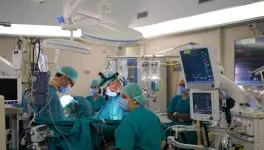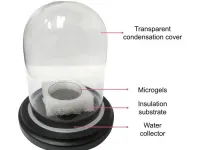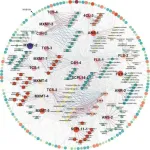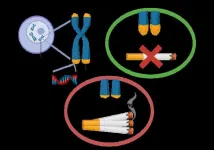(Press-News.org) FINDINGS
UCLA-led research finds that among adult congenital heart disease (CHD) transplant recipients, single-ventricle physiology correlated with higher short-term mortality. But 10-year conditional survival was similar for biventricular and most single-ventricle CHD patients, and notably better for biventricular CHD patients compared to non-CHD heart transplant recipients.
BACKGROUND
Congenital heart disease (CHD) is a heterogeneous group of structural abnormalities that can be thought of as spectrum from very severe lesions requiring multiple surgeries to others that are not as high risk. Historically, single-ventricle CHD subtypes were all considered higher risk than their biventricular counterparts, which would lead to some transplant centers being hesitant to perform a heart transplant in these patients.
METHOD
The researchers analyzed National (Nationwide) Inpatient Sample and Organ Procurement and Transplantation Network data sets for 2005-2020. Of 382 adult heart transplant recipients with congenital heart disease (CHD), 185 (48%) had single-ventricle physiology. Compared to patients with biventricular CHD, those with single-ventricle CHD showed significantly reduced survival at 1 year (80% vs 91%) and 10 years (54% vs 71%). Among patients who survived the first post-transplantation year, biventricular CHD patients exhibited similar 10-year survival as single-ventricle patients, except for those with hypoplastic left heart syndrome (79% vs 71%). Additionally, biventricular CHD transplant recipients showed significantly better 10-year conditional survival compared to their non-CHD counterparts (79% vs 68%).
Study limitations include a lack of granularity in the data sets which would have allowed analysis of all aspects involved in transplantation. Also, there were no common patient identifiers between the two data sets, so the researchers had to rely on novel probability linkage methodology to match the records.
IMPACT
The findings have significant implications toward patient selection and listing strategies, easing concerns related to heart transplantation in adults with CHD and destigmatizing most subtypes of single-ventricle CHD.
COMMENT
“To date there have been no large-scale, national studies looking at survival outcomes in single-ventricle patients, despite the extensive availability of transplantation data dating back to 1987,” said lead author Dr. Syed Shahyan Bakhtiyar, visiting research scientist in the UCLA Division of Cardiac Surgery and a general surgery resident at the University of Colorado. “Consequently, not only have patients and their families lacked essential prognostic insights, but surgeons and transplant teams have also been limited in their ability to make fully informed decisions about listing practices and transplantation for these patients. Our findings not only alleviate concerns associated with heart transplantation in adult CHD patients as a whole, but also work towards destigmatizing most subtypes of single-ventricle CHD.”
AUTHORS
Study co-authors are Sara Sakowitz, Konmal Ali, Dr. Nikhil Chervu, Arjun Verma, Dr. Ming-Sing Si, and Dr. Peyman Benharash of UCLA, and Dr. David D’Alessandro of Massachusetts General Hospital.
JOURNAL
The study is published in the peer reviewed Journal of the American College of Cardiology.
END
UCLA research suggests that heart transplantation is safer for adults with single-ventricle CHD than previously thought
2023-09-12
ELSE PRESS RELEASES FROM THIS DATE:
Turmeric may be as good for treating indigestion as drug to curb excess stomach acid
2023-09-12
A natural compound found in the culinary spice turmeric may be as effective as omeprazole—a drug used to curb excess stomach acid—for treating indigestion symptoms, suggests the first study of its kind, published online in the journal BMJ Evidence-Based Medicine.
Turmeric is derived from the root of the Curcuma longa plant. It contains a naturally active compound called curcumin thought to have anti-inflammatory and antimicrobial properties, and has long been used as a medicinal remedy, including ...
Shorter white blood cell telomeres linked to higher dementia risk
2023-09-12
Shorter telomeres on the ends of white blood cell chromosomes may signal a heightened dementia risk, suggest the results of a large long term study, published online in the journal General Psychiatry.
They are associated with smaller total and white matter brain volume, which helps the body process information, and may be a predictor of future brain health, say the researchers.
A telomere–the equivalent of a shoelace cap—is intended to prevent the loss of coded DNA by a chromosome fraying or unravelling when it replicates.
Each time a cell divides, chromosomes replicate, and telomeres shorten slightly, ...
Around 1 in 3 UK medical students plans to leave NHS within 2 years of graduation
2023-09-12
Around 1 in 3 UK medical students plans to leave the NHS within 2 years of graduating—either to practise abroad or to abandon medicine altogether—suggest the results of the largest survey of its kind, published in the open access journal BMJ Open.
Pay, work-life balance, and working conditions are the key drivers behind the decisions to leave, the responses indicate.
The UK has 3.2 doctors for every 1000 people, ranking 25th among the Organisation for Economic Co-operation and Development (OECD) countries. This figure also represents the lowest number of doctors per head among European ...
Work stress, workload, understaffing driving out health professionals from NHS
2023-09-12
Work stress, high workload, and understaffing are the primary factors driving health professionals out of the NHS, suggest the results of a survey published in the open access journal BMJ Open.
The findings prompt the researchers to suggest that pay increases alone may not be sufficient to fix NHS staff retention.
There are well over 100,000 staff vacancies in the NHS. And worsening retention of NHS health professionals has been attributed to the fall-out from the COVID-19 pandemic.
To explore this further, the researchers wanted to assess the relative ...
Hot summer air turns into drinking water with new gel device
2023-09-12
For significant portions of the globe faced with water shortage problems, a beacon of hope may be on the way: the ability to easily turn hot air into drinking water.
For the past few years, researchers at The University of Texas at Austin have focused on the moisture present in the air as a potential source of drinking water for drought-stressed populations. In new research published in the Proceedings of the National Academy of Sciences, they reached a significant breakthrough in their efforts to ...
Young people who vape more likely to report chronic stress
2023-09-12
Milan, Italy: Young people who have used e-cigarettes are more than twice as likely to report experiencing chronic stress, according to research presented at the European Respiratory Society International Congress in Milan, Italy [1].
The study was presented by Dr Teresa To, a senior scientist at The Hospital for Sick Children (SickKids) in Toronto, Canada. She said: “Research is starting to show how vaping affects young people’s physical and mental health. For example, our previous research has shown that those who vape are more likely to suffer an asthma attack. In this study we were particularly interested in the relationship between vaping, ...
Novel study reveals the accumulation mechanisms of purine alkaloids and catechins in theobromine-rich tea
2023-09-12
Camellia ptilophylla, a low-caffeine or decaffeinated tea, is increasingly being recognized for its potential health benefits. However, there is intraspecific diversity in purine alkaloid and catechins components in C. ptilophylla populations. Analyzing the mechanisms behind the accumulation of these metabolites is important for improving tea quality.
Beverage Plant Research published online a paper by Associate Professor Binmei Sun and Shaoqun Liu’s team at South China Agricultural University entitled “Differential accumulation mechanisms of purine alkaloids and catechins in Camellia ptilophylla, a natural theobromine-rich ...
Transplanting patients’ own lung cells offers hope of ‘cure’ for COPD
2023-09-12
Milan, Italy: For the first time, researchers have shown it is possible to repair damaged lung tissue in patients with chronic obstructive pulmonary disease (COPD) using the patients’ own lung cells.
The European Respiratory Society International Congress in Milan, Italy [1], heard that 17 patients who took part in a phase I clinical trial were able to breath better, walk further and had better quality of life after receiving the experimental treatment.
COPD kills approximately three million people worldwide every year. It is a severe respiratory disease that involves progressive damage to lung tissue. The affected tissue cannot be repaired ...
Genetic evidence shows that smoking can cause us to age faster
2023-09-12
Milan, Italy: A study of nearly 500,000 people has shown that smoking shortens the end fragments of chromosomes in the white blood cells of our immune systems. The length of these end fragments, called telomeres, is an indicator of how quickly we age and our cells’ ability to repair and regenerate.
In her presentation to the European Respiratory Society International Congress in Milan, Italy [1], Dr Siyu Dai, who is an assistant professor in the School of Clinical Medicine, Hangzhou Normal University, and also an honorary postdoctoral researcher in the department of paediatrics, The Chinese University of Hong Kong, said: “Our study shows that smoking status and ...
Alive without a pulse: Evolution of durable left ventricular assist devices
2023-09-11
https://www.scienceopen.com/hosted-document?doi=10.15212/CVIA.2023.0056
Announcing a new article publication for Cardiovascular Innovations and Applications journal. Durable left ventricular assist devices (LVADs) offer a viable option for patients with advanced heart failure and have been demonstrated to be superior to optimal medical therapy in terms of both mortality and quality of life, in selected patients. However, durable LVADs can be associated with severe morbidity. Because the rates of cardiac ...





